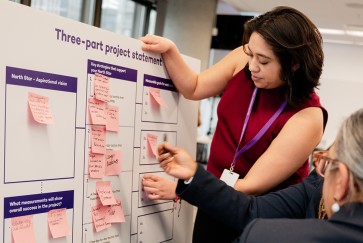Charles Whitaker has been named dean of Northwestern University’s Medill School of Journalism, Media, Integrated Marketing Communications, Provost Jonathan Holloway announced today. Whitaker’s term will begin July 1, 2019.

Whitaker, who joined Medill in 1993, had served as interim dean beginning in July 2018. He will become the ninth dean of the school. He is a double alumnus of Medill, having earned both his bachelor’s and master’s degree from the school.
Holloway said Whitaker emerged from a national search of highly respected, prominent candidates.
“I am delighted to appoint Charles Whitaker as the dean of Medill,” Holloway said. “While we were pleased to attract a great deal of talent in our national search, ultimately it was clear that Charles is the right person to guide Medill into its next chapter. I have tremendous confidence in his ability to lead, educate and advocate for all members of the Medill community.
At Medill, Whitaker has taught courses in news writing, magazine writing, magazine editing and blogging. In addition to teaching in Medill’s graduate and undergraduate programs, Whitaker teaches in Northwestern’s School of Professional Studies and the High School Journalism Institute, also known as the Cherub program.
“It’s an honor and a privilege to be the first Medill alumnus selected to serve as dean,” Whitaker said. “I care deeply about the school, particularly the students, faculty and staff who have made Medill such a vaunted institution in the fields of journalism and integrated marketing. Our industries have been disrupted by tremendous technological changes. But rather than shrink from those challenges, we embrace the opportunities they present for Medill to provide leadership as well as highly trained talent for our fields.”
He said that as Medill approaches its centennial in 2021, he is energized by signs of institutional health that buoy the school — strong enrollment, talented, highly engaged faculty and staff, and bright and industrious students.
“But we can’t rest on those laurels,” Whitaker said. “At a time when journalism is under assault around the world and the digital manipulation of images and video makes it increasingly difficult to determine the veracity of a message, Medill must stand as a beacon for truth and ethics in communication. It is not enough for Medill to be a training ground for prodigious young journalists and marketers. We must be the champions and standard bearers of our industries — both journalism and marketing — and a strong voice for press freedom domestically and abroad.”
Whitaker’s impact, at Medill and beyond, has been tremendous. He was one of the rotating directors of Medill’s graduate Magazine Publishing Project, an enterprise in which teams of students developed a new magazine or worked in collaboration with an existing publishing company to reinvigorate the editorial and business approach of an existing magazine. For nine years, Whitaker directed the Academy for Alternative Journalism, a summer fellowship program that trained young writers for work at the member publications of the Association of Alternative Newsweeklies in an effort to address the field’s lack of diversity.
Before joining the Medill faculty, Whitaker was a senior editor at Ebony magazine, where he covered a wide range of cultural, social and political issues and events, including two U.S. presidential campaigns and the installation of the first black members of the British Parliament.
Whitaker began his journalism career as a newspaper reporter at the Miami Herald. From the Herald, he went to the Louisville Times, where he worked as a deputy feature editor and enterprise feature and arts writer. He has received commendations for his work from a number of journalism societies, including The National Association of Black Journalists, The Society of Professional Journalists and the National Education Writers Association. Recently Whitaker was elected to the national board of the American Society of Magazine Editors, where he has also served as a judge for their annual awards.
Whitaker is the co-author of “Magazine Writing,” a textbook that examines the magazine industry and deconstructs the art of feature writing for consumer and business-to-business publications. He also is the author of four statistical analyses of the hiring of women and minorities in the magazine industry and has served as an adviser on diversity issues for the Magazine Publishers of America.
He was the co-director of Project Masthead, a program designed to encourage students of color to consider careers in magazines on both the editorial and business side of the industry, and he is one of the co-curators of the Ida B. Wells Award, presented by both Medill and the National Association of Black Journalists to individuals who are working to increase newsroom diversity and improve the coverage of communities of color.
Whitaker has conducted research on the ontological and methodological similarities and differences between immersion journalism and social science field research, and he has studied and written about the efficacy of single-gender schools in improving the academic achievement of African-American boys. He has written extensively on diversity in media and executed the only census of the magazine industry, which analyzed the employment of women and people of color in the field.
Whitaker succeeds Brad Hamm, who served as Medill’s dean from the beginning of the 2012-13 academic year until he stepped down after the 2017-18 academic year.

